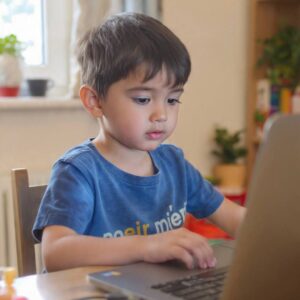In today’s digital world, programming has become a fundamental skill, akin to reading and writing. This blog post explores why teaching kids to code is an investment in their cognitive, creative, and professional development.
Introduction
In today’s digital world, coding has become as fundamental as reading and writing. Introducing children to programming at an early age is no longer just a trend—it’s a transformative step in preparing them for a future shaped by technology. From enhancing problem-solving skills to opening the door to diverse career opportunities, the benefits of learning coding at a young age are vast and long-lasting.
This article explores why teaching coding to kids is an investment in their cognitive, creative, and professional development.
1. Strengthening Problem-Solving and Critical Thinking
Coding is essentially about breaking down complex problems into smaller, manageable steps and solving them systematically. When kids learn to code, they develop a structured approach to problem-solving. They learn to analyze a challenge, identify patterns, and design logical steps to overcome it.
For example, when a child writes a program to animate a character in a game, they need to consider variables like speed, direction, and user input. If the program doesn’t work as expected, they debug it by tracing errors and testing solutions. This iterative process teaches persistence and patience, while reinforcing the idea that failure is simply a step toward success.
2. Boosting Creativity and Innovation
Coding is often described as the perfect blend of logic and art. It provides children with a platform to express their creativity through building games, designing websites, or creating animations. Unlike traditional creative tools such as painting or music, coding enables kids to bring their ideas to life in an interactive and dynamic way.
Platforms like Scratch, developed by MIT, allow young learners to build their own stories or games using drag-and-drop programming blocks. This hands-on experience encourages experimentation, innovation, and thinking outside the box. Coding empowers children to design unique projects that reflect their personalities and interests, giving them a strong sense of ownership and pride.
3. Preparing Kids for a Tech-Driven Future
Our world is increasingly dependent on technology, and coding is at the heart of this transformation. From artificial intelligence to mobile apps, programming is the backbone of modern innovation. By learning coding early, kids gain an advantage in understanding how technology works and prepare themselves for future careers in software development, data science, cybersecurity, and beyond.
According to the U.S. Bureau of Labor Statistics, computer and IT occupations are projected to grow by 15% from 2021 to 2031, much faster than the average for all jobs. Early exposure to coding equips children with high-demand skills, giving them a competitive edge in the job market.
4. Encouraging Collaboration and Communication
Coding is rarely a solo effort—it often requires teamwork. Whether in group projects at school or contributing to open-source communities, coders share ideas and collaborate to achieve common goals. When kids learn coding, they also develop teamwork and communication skills by explaining their ideas, debugging with peers, or presenting their projects.
For instance, coding camps for kids often include pair programming, where two children work together on one project, taking turns writing and reviewing code. This collaborative environment teaches them how to communicate technical concepts clearly and value diverse perspectives—skills that are essential in any workplace.
5. Building Confidence and a Growth Mindset
Learning to code can be challenging, but overcoming those challenges is highly rewarding. When a child successfully writes a program or fixes a bug, they experience a strong sense of accomplishment that boosts their confidence.
This process also instills a growth mindset—the belief that abilities can be developed through effort and learning. For example, a child who builds a simple game or app from scratch learns that perseverance pays off. They begin to view mistakes not as failures but as opportunities for improvement, encouraging lifelong learning and adaptability.
6. Introducing Computational Thinking
Computational thinking is a structured approach to problem-solving that includes concepts like abstraction, decomposition, and algorithmic thinking. Coding introduces these ideas to children in a practical and engaging way.
For instance, when a child programs a robot to navigate a maze, they break the task into smaller steps (decomposition), design a sequence of commands (algorithmic thinking), and focus only on essential elements (abstraction). These skills extend far beyond coding, enabling children to tackle complex challenges in any discipline—from science to business.
7. Opening Doors to Diverse Opportunities
Coding is a versatile skill that applies across countless industries. Whether a child is interested in gaming, healthcare, finance, or environmental science, coding has a role to play. Early exposure to coding allows kids to explore their interests and discover how technology intersects with their passions.
For example, a child passionate about the environment might learn to code data visualizations that track climate change. Another interested in storytelling could create interactive narratives or animations. Starting early gives kids the opportunity to explore different paths and make informed decisions about their future careers.
8. Making Learning Fun and Engaging
Coding is inherently interactive, making it an enjoyable way for children to learn. Many platforms designed for kids—such as Code.org, Blockly, and Tynker—integrate gamification elements like rewards, challenges, and colorful interfaces. These features turn learning into a playful experience that keeps kids motivated.
For instance, Code.org courses often feature characters from popular games like Minecraft or Star Wars, letting children code their favorite heroes’ actions. This approach makes learning coding relatable, accessible, and exciting.
9. Enhancing Digital Literacy and Responsibility
In a world where technology is everywhere, understanding how it works is crucial for navigating it responsibly. Coding helps children become informed digital citizens who understand key concepts like data privacy, online security, and ethical technology use.
For example, a child who learns about data collection while coding will be better prepared to question how apps and websites use their personal information. This awareness promotes responsible digital behavior from a young age.
10. Encouraging Lifelong Learning
Technology evolves rapidly, and coding is a field that requires continuous learning. Starting early fosters a curiosity-driven approach that prepares children for a lifetime of adapting to new tools and innovations.
A child who begins with Scratch may later progress to learning Python or JavaScript. This gradual progression builds a foundation for lifelong learning, ensuring that they remain adaptable in a fast-paced, tech-driven world.
How to Get Started with Coding for Kids
If you’re a parent or educator looking to introduce coding to children, there are plenty of accessible resources available:
-
Online platforms: Websites like Scratch, Code.org, and Tynker offer free beginner-friendly coding tutorials.
-
Coding toys and kits: Tools like LEGO Mindstorms or Micro:bit combine physical building with programming, making learning hands-on and fun.
-
Coding camps and classes: Many schools and community centers offer workshops or after-school programs for young learners.
-
Parental involvement: Parents can join the learning journey using platforms like Codecademy or free YouTube tutorials, making it a shared experience.
Conclusion
Teaching kids to code at an early age is an investment in their future. It equips them with critical thinking, creativity, and technical skills that are essential in today’s technology-driven world. Beyond preparing them for high-demand careers, coding fosters resilience, collaboration, and a love of learning that will serve them throughout life.
By introducing coding early, we empower the next generation not only to navigate the digital era but also to shape it with confidence and innovation.
Start with small steps, and watch children unlock a world of possibilities through coding. The earlier they begin, the brighter their future will be.





